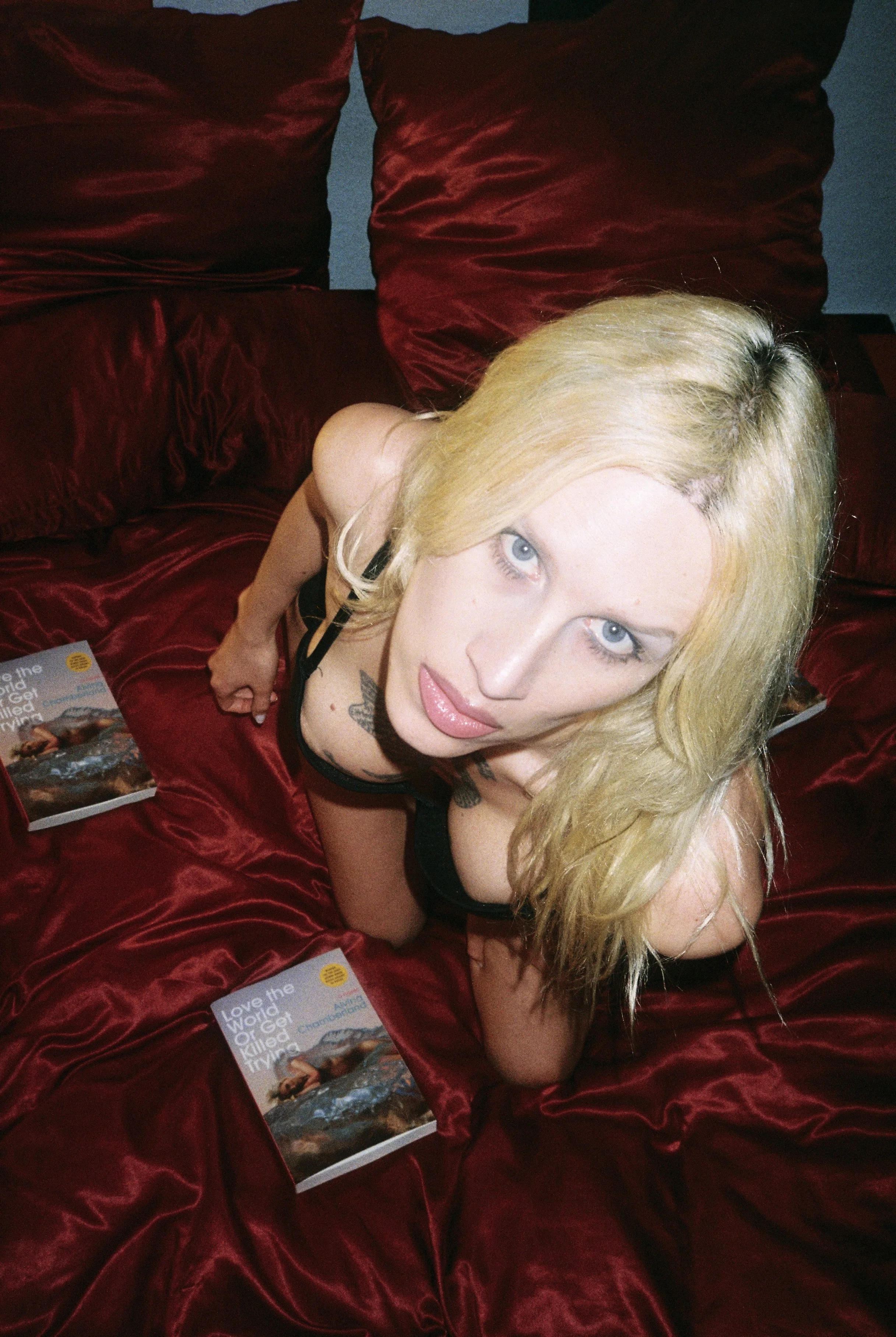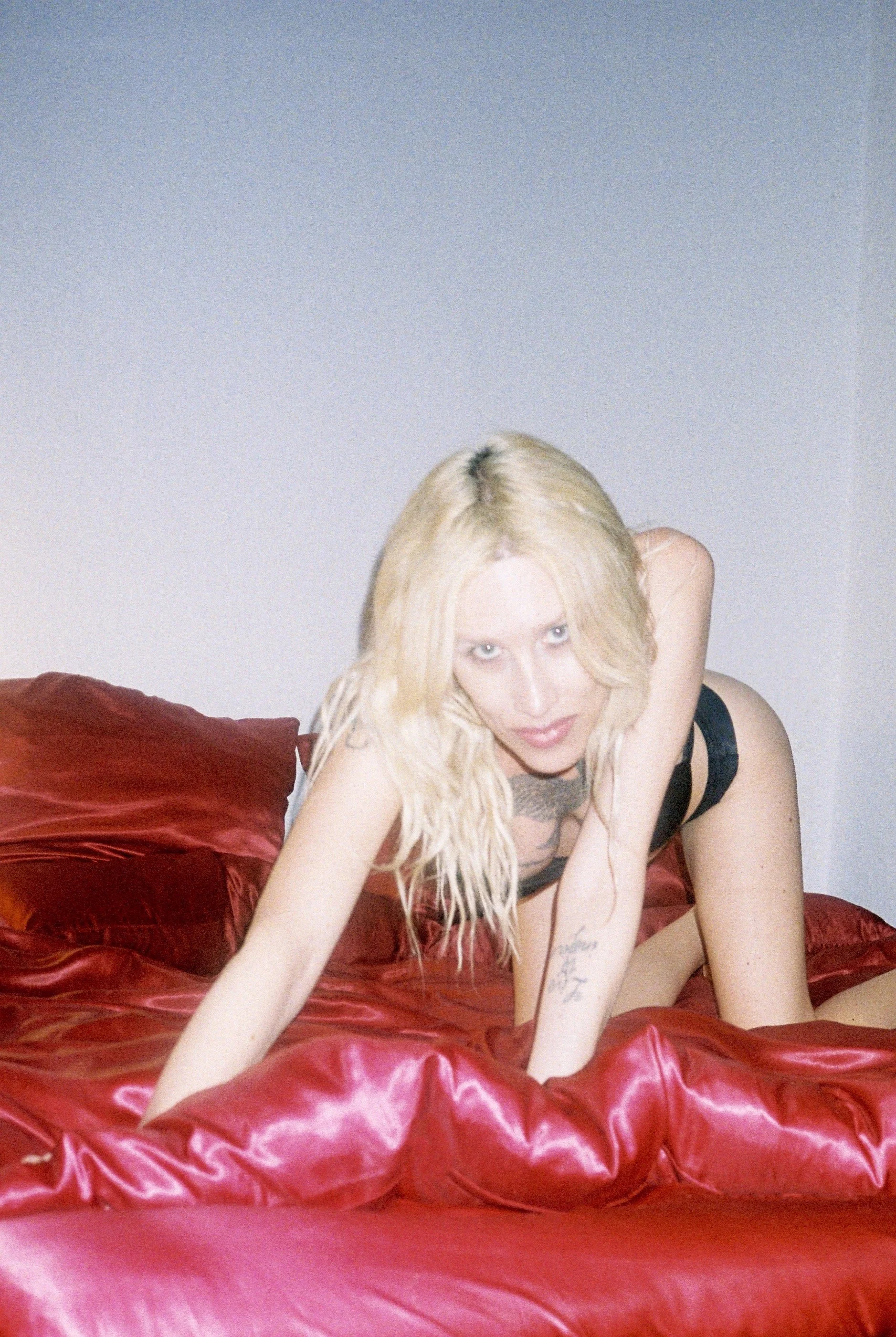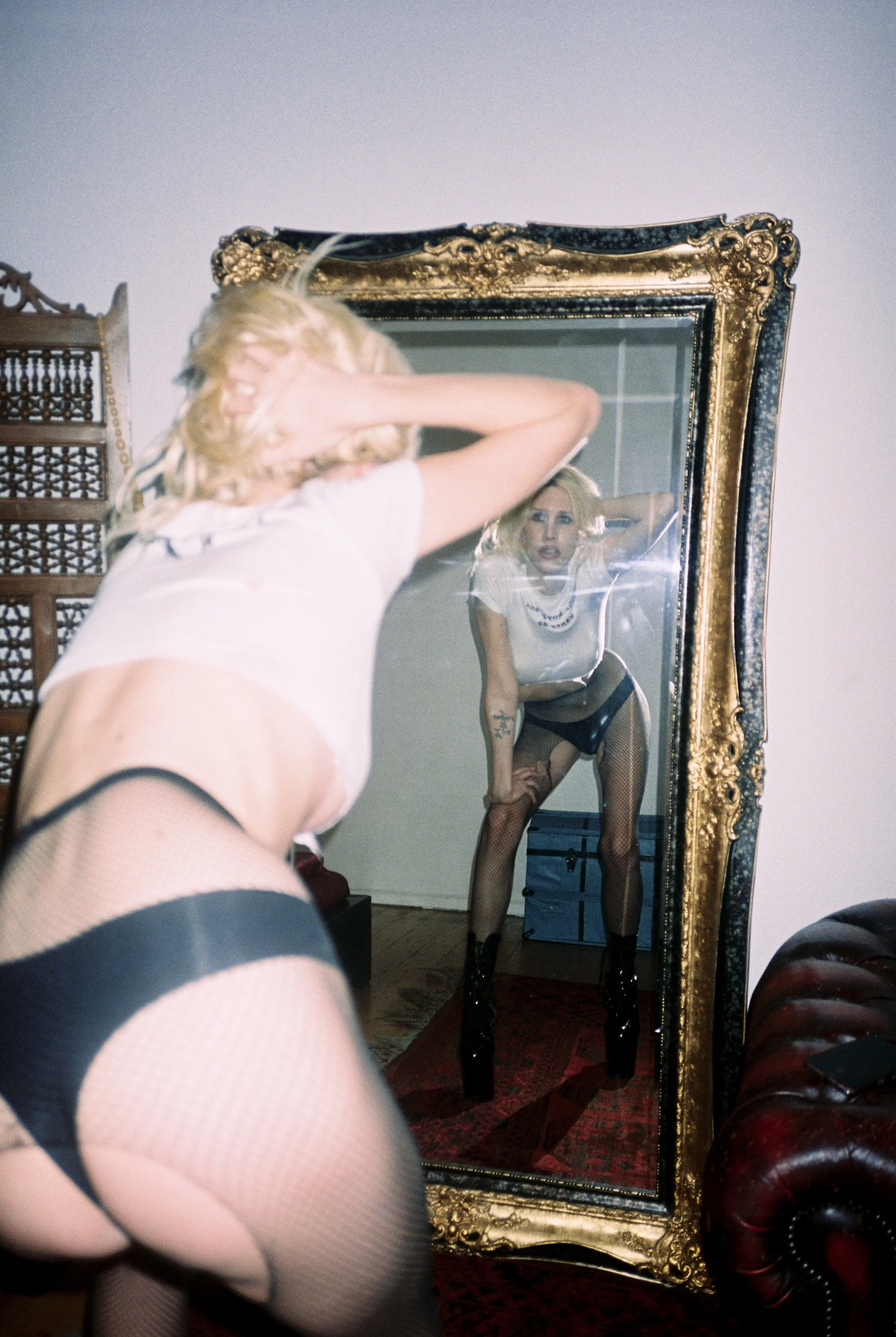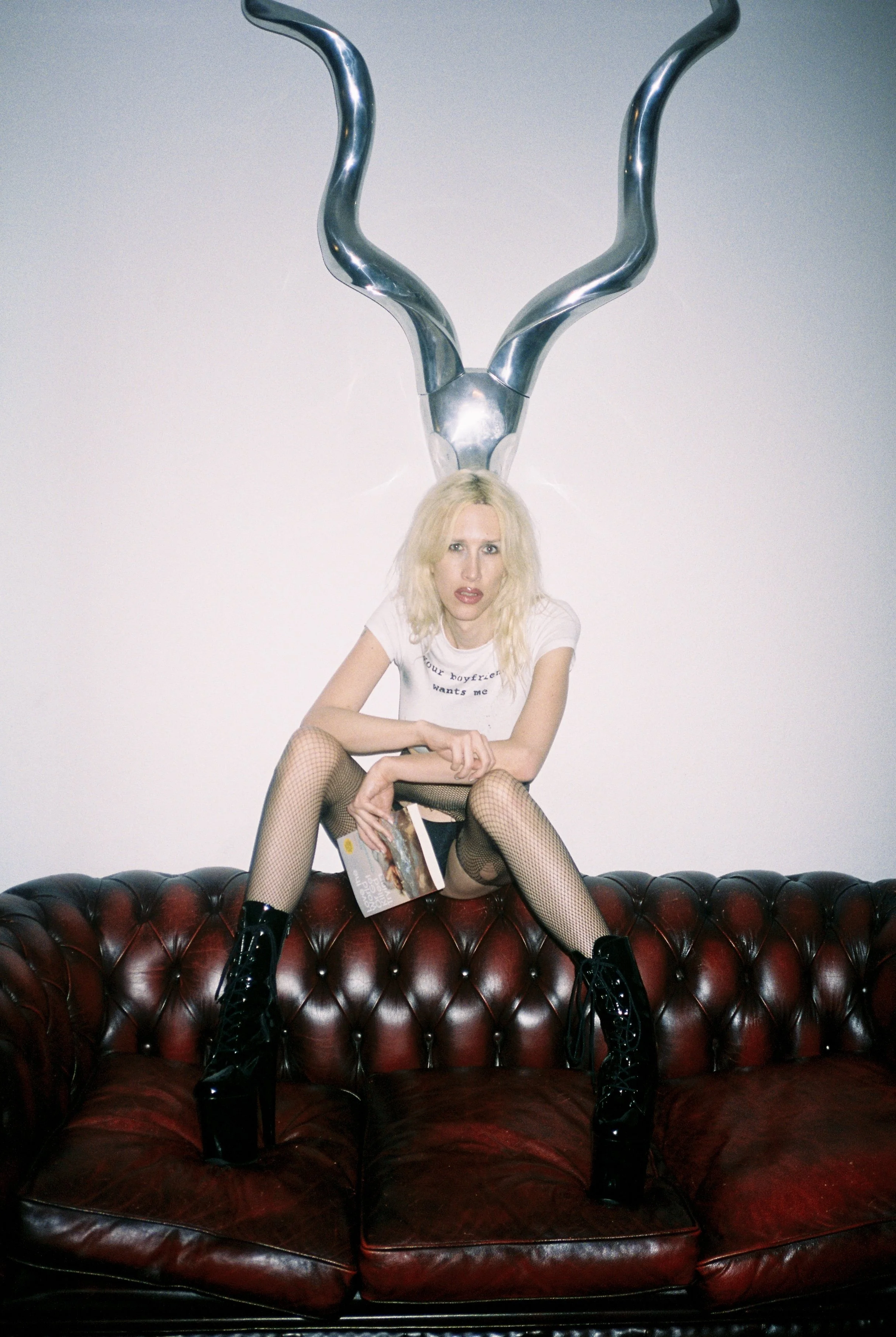Loving the World: Alvina Chamberland in conversation with Eliot Duncan
Words: Eliot Duncan
Make it stand out
When I first read Love the World or Get Killed Trying, I felt a vivid and loving proximity. Alvina’s work stays with me in its shimmering, wild propensity for broad, spirited joy despite being the aim of violence again and again. At the Berlin launch of my debut novel Ponyboy this summer, she agreed to read from her highly anticipated English language debut.
She was effervescent, kind and present even as she read the stark and brutal opening to her novel, confidently waiting for the audience to settle before proclaiming: ‘NO’. That’s what I adore about Love the World, and Alvina. There’s an insistent and smiling lightheartedness that doesn't look away, deny or censor the dark the world casts. Alvina so generously shows readers, in an immersive, stream of consciousness genius, that to be a transsexual is to love the world at all, gnarly costs. Alvina and I discussed her English language debut, trans literary lineage, her SCREAM-of-consciousness prose style and loving men.
Eliot Duncan: How do you situate your work in the history of literature? Love the World, to me, is absolutely Woolf and Lispector’s virtuosic daughter.
Alvina Chamberland: Oh my god, thanks for this question, as I feel it’s a question I’ll rarely get. It’s too easy to box trans authors together, and you’ve definitely got my lineage right! Time period wise almost all my favorite books seem to have been written between 1910 and 1980, somehow modernism felt like a way of getting closer to our real and raw emotions, while postmodernism went up into the head, which is not the space I write from. The practice of ecriture feminine, feminine writing, appeals to me, giving the body, and the emotions, and the non-linear and more internal experiences of life, space to exist. People still deem this “experimental” or “difficult”, but I just feel that’s letting masculine logic prevail over feminine intuition. Clarice Lispector is most definitely my greatest influence, and beside her probably Jamaica Kincaid, Violette Leduc, Sylvia Plath, and Ingeborg Bachmann.
I think when I wrote the bulk of Love the World or Get Killed Trying in 2018 I had read perhaps 2 or 3 novels by trans authors in my lifetime, none of which I felt particularly inspired by... Luckily, since then I have read trans authors whose work I like… For example yours ;-)
Your book so pragmatically and lovingly navigates being a transsexual. There’s this resistance to being precious or tender about your trans identity, which was such a joy to read. Can you tell me more about this and your own view of transsexuality?
It’s changed so much through the years. Up until about 2 years ago I didn’t have to tell anyone I’m a trans woman, you could tell from far away. Now that that’s changed, so has my way of navigating my own transness. In my daily life I just want to go with the flow and be treated as the woman I am, and not volunteer information that makes me vulnerable. I wanna talk about it less and write about it more. I fought hard to reach this point and don’t want to struggle more than I have to. I wrote most of the novel 5.5 years ago in a time where I, like most trans people in the world, didn’t pass. And I would say the core of me hasn’t changed, I don’t want to be “normal” or “assimilate”, however nowadays I’d rather stand out in other ways than through my transness. It’s exhausting to constantly be othered, especially if you, like straight trans women, don’t have a queer bubble to lean back into.
What I long for here are two things: 1. That people wouldn’t change their opinion on me, or degrade me, when learning I’m trans; and 2. That openly stating “I’m a trans woman”, wouldn’t make people see me as less of a woman, just as a water lily that, compared to other flowers, had to fight through one extra element to bloom.
And as for the word transsexual, I love it precisely because it resists the preciousness and tenderness around trans identity, instead veering towards the raw. And geez, what a boring novel one would write if one prioritized being politically correct over being raw, and questioning not just the general status quo but also the trans activist status quo… If we’re going to evolve we need to dare to ask questions.
Love the World is a shimmering example of how immediate and intimate stream of consciousness prose can be. Did you plan for the text to be told in that way or did the form of the language just arrive to you as you went?
I definitely didn’t plan it, I write the way I feel, and the way I feel is stream-of-consciousness, sometimes SCREAM-of-consciousness, depending upon my mood :). I think the beauty of stream-of-consciousness is precisely that it is not planned, it allows intuition and fragmentary thought-feelings, and that which doesn’t quite make sense to take over - like it always does in life. Most of all, I can’t write in another way… I think I’m fully incapable of writing a “normal novel”, it’s just not the way my brain, my heart, or my body works. It feels alien to me.
I know you have talked before about this idea that “cleanliness” can ruin literature, does this sense of sanitation come from tidying up the wild and winding propensity of stream of consciousness prose? It seems to me that one major strength of stream of consciousness prose is that it doesn't turn away from the gnarly, detailed thoughts of the protagonists, it’s ever present in each utter moment, like the protagonist’s consciousness is the fiber of the story.
Totally, to me a novel where everything feels in its place and nothing falls apart or feels too much or “unnecessary”, where an editor deleted an author’s extremes and eccentricities, is just so boring. It feels like being in a romantic relationship without all the messiness that passion and falling in love entails. You take out the best and worst parts and are left untouched and unfeeling. Maybe that’s the logical way to make a lifelong marriage work, or craft a bestseller, but there’s more to life and love and literature and art than this…
Love the World chronicles this frank and sweet desire for men. What does it mean to so directly and openly love men? I also fall in love with and date men and, at one point, felt a sort of shame around that, coming from a tender queer zeitgeist that insisted that cis-men are everything that’s wrong with the world. I've since freed myself from that dogma but how do you see it?
Well first of all, without my love for men I would have never become a writer… When I’m in passionate love with a man it works like an engine for my self expression - my revenge on patriarchy is taking on all these male muses… I’m not one of these people who started writing as I child, no, I started writing seriously the moment I fell madly in unrequited love for the first time when I was 19 and the overflowing emotions couldn’t be contained and desperately needed an outlet. It’s kind of the same way today, if I’m happy I’d rather be by the beach or doing nothing.
I’ve had many of my most terrible experiences with men, as well as my most beautiful ones, especially in the last few years, the more I’ve passed… So, I would say I have this kind of love-hate relationship towards cis men. I mean it would be hard to feel any other way given the specific treatment that straight men give to us trans girls, loving us in private, while almost never standing up for us in public, or even wanting to be seen beside us. And white northern european middle class men tend to be the most transphobic, learning the right progressive opinions, and living the most conservative bourgeois lives…
I have a great love for the male form and the specific way some men can make me feel when they caress my curves and look me in the eye or hold my hand in front of many people… The way my femininity contrasts with their masculinity turns me on, and I don’t think that has to be patriarchal. Feminists should read more and learn more from Luce Irigaray and understand that sameness is not the only way to equality, in fact usually it just leads to the eradication and demonization of femininity…
You write about such intense and enraging violence alongside visceral and exuberant joy in Love the World. Can you talk a little bit about these two things? I love how you describe yourself as interested in only Intensity and Serenity. How did or does that shape your writing?
I keep coming back to love, and how I’m not a fan of the pragmatic, nice relationships whose main addition to one’s life is stability… And by that I don’t mean that I have no need for stability, I do, especially sometimes, especially since I’m someone sensitive enough to be easily rocked off-balance… yet… if anything feels meaningful in life it is truly, deeply feeling. And in a love relationship, whether that relationship be to a man or to a pad of paper (I can’t fully separate the two), intensity and serenity should really go hand in hand. The thing about serenity is that it is felt intensely, and the thing about the storm is that there is calm inside its eye…
Alvina Chamberland is the author of LOVE THE WORLD OR GET KILLED TRYING, out now in the US and UK. Eliot Duncan is the author of PONYBOY.
A note on the photoshoot from Alvina Chamberland:
“A man may adore us in private, and find us sexier, smarter, funnier, and more charismatic than the cisgender girl who’s been flirting with him, and yet still choose her as his girlfriend. Because it’s easier, because there is no stigma involved in being with her. Society may call this “true love”, but I call it an enhancer of one’s image and masculinity. There are moments when I think, “Alvina, you have so many hot and famous guys who want to fuck you, so why don’t you just lean into that and enjoy it”, but the fact is sex in itself is never what I need, as it’s love that makes me feel fulfilled, seen for who I am… And furthermore, it’s love out in the open that makes me feel validated as a full woman-human being with equal worth, value, and belonging as everyone else (I already love myself and know I’m deserving of love, but I also know we live in a world where many of us do not get anywhere near what we deserve). Without feeling loved, it’s an uphill battle to not end up feeling empty. Sometimes I feel tempted to out every single man who writes me in my DM’s, and that thought doesn’t make me crazy. What’s fucking crazy is that we live in a world where anyone feels the need to hide someone they desire. Really, I wish we didn’t have to out any straight men, that they would get secure in their masculinity, live up to their reputation of being courageous, and open up and acknowledge their attraction to us; say YES I slept with this hot trans girl, YES I am in love with her, YES she is my girlfriend. And what would happen to the specific transmisogyny then that is so based in all these secrets and lies? It would fade away, start to resemble regular misogyny, something still incredibly important to fight, but far from as devastating, far from as lethal, far from as heartbreaking.
Why am I doing such a sexy photoshoot to promote something serious like a novel? For me the answer is simple. It’s anti feminine sexism that says you cannot be both sexy and intellectual; and literature has long been incredibly conservative here. The literary and academic world has its own version of the Madonna-Whore complex, where any woman who expresses her sexuality cannot be marriage material, cannot be an intellectual, creative, artistic subject. I have this punk rock spirit within me that always feels the need to subvert things and go against the flow of what may provide more short term gain. I pose naked on the book cover because the stereotype of a trans woman is a man in a dress, my pose is vulnerable, asking for protection, because trans women are never protected and rarely seen for our vulnerability and humanity. Publishing a novel, especially a work of autofiction, is anyways a moment of both intense visibility and vulnerability, but us trans girls are used to that. I know I’ve had to work twice as hard for this than most of my cis colleagues. It wasn’t many years ago no one would take us seriously as artistic creators.”
Photography and styling: Tiresia | Concept: Tiresia and Alvina Chamberland






